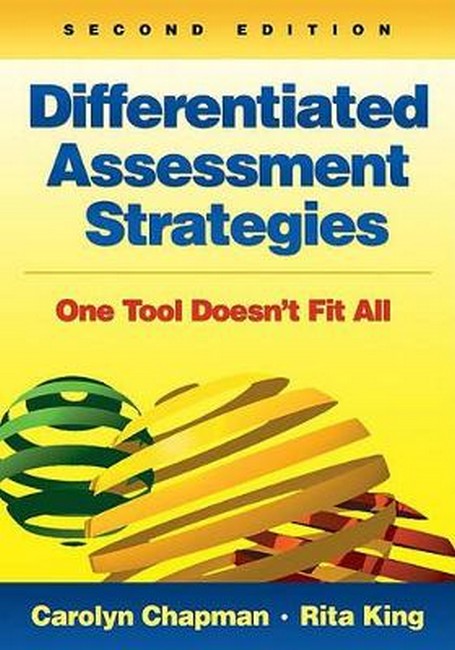Carolyn Chapman is an international educational consultant, author, and teacher who has taught in kindergarten to college classrooms. Her interactive, hands-on professional development training sessions challenge educators to use strategies that ensure success for learners of all ages. Chapman has written many books about differentiated instruction, multiple intelligences, multiple assessments, and the brain-compatible classroom. She is coauthor with Gayle Gregory of the landmark Corwin Press book Differentiated Instructional Strategies: One Size Doesn't Fit All. Rita King has more than 20 years of teacher training experience and administrative experience as principal and director of Middle Tennessee State University's teacher training program in the laboratory school. Most recently, she was an adjunct professor in the Department of Educational Leadership at the university. She now consults internationally in the areas of multiple intelligences, practical applications of brain-based research, differentiated learning, reading and writing strategies, mathematics instruction, creating effective learning environments, and strategies for test success. She is the coauthor of Differentiated Instructional Strategies for Reading in the Content Areas, Differentiated Instructional Strategies for Writing in the Content Areas, and Differentiated Assessment Strategies: One Tool Doesn't Fit All.
Request Academic Copy
Please copy the ISBN for submitting review copy form
Description
Preface Acknowledgments About the Authors 1. One Tool Doesn't Fit All: Introduction What Is Differentiated Assessment? Analyzing Your View of Differentiated Assessment Building the Toolbox to "Zap the Gaps" Assessment in the Age of Accountability What Is the Teacher's Role in Differentiated Assessment? Opening the Toolbox 2. Bringing Research and Best Practices to Differentiated Formative Assessment Processing Information and Memory Why Students Forget and Why They Remember Assist the Brain in Memory Processing Develop Intelligent Behaviors for Assessment Authentic Assessment Performance Feedback 3. Creating a Climate for Formative Assessment The Affective Domain and Assessment Emotions Emotional Intelligence Self-Efficacy Motivation for Assessment The Physical Environment Setting Climate Goals 4. Knowing the Learner Information Gathering Gardner's Multiple Intelligence Theory Exploring Goleman and Sternberg More Ways to View Learners Through Animals' Eyes Performance Level Titles for the Assessed Learner Summary 5. Exploring Self-Assessment What Is Self-Assessment? What Is Self-Talk? Self-Talk for Task Assessment Teaching Self-Assessment Why Is It Important to Teach Learners How to Self Assess? Self-Checking Techniques for Assessment Assess On-Task Behaviors Summary 6. Formative Assessment Before the Learning Personalize Instructional Planning Engaging Students Before the Learning Summary 7. Formative Assessment During the Learning Formative Assessment Tools to Use During the Learning Summary 8. Formative Assessment After the Learning Assessment Tools: After the Learning Bloom's Taxonomy for Comprehension Assessment Summary 9. Differentiating Summative Assessments How Can Standardized Assessments Be Differentiated? Create a Positive Testing Environment Give Effective Directions Teach Test-Taking Skills Grading Summary 10. Assessment for Differentiated Instruction and Flexible Grouping Using Technology for Assessment Assessment Cubing Choice Boards Assessment Agendas Station, Centers, and Learning Zones for Assessment Assessment for Flexible Grouping Evaluating Group Work Group Discussion: Assessment Troubleshooting Tools for Group Assessment Summary 11. Differentiated Instructional Planning Models Adjustable Assignment Model Curriculum Compacting Model Academic Contract Model Project-Based Model Problem-Based Model Summary 12. Planning for Differentiated Assessment Step Up to Formative Assessment Planning Content, Process, Product, and Learning Disposition Assessment Essential Questions for Planning Assess the Assessment Tool Teaching Assessment Strategies Effective Differentiated Assessment Practices Generate Change for Differentiated Formative Assessment Summary Bibliography Index Summary
"This is a book that should be in the hands of every educator. It is practical, easy to use and such a great collection of assessments that can be easily implemented in any subject area." -- Jennifer Harper, Teacher "This book includes practical, helpful strategies and processes for differentiating instruction and assessment. The models, strategies, and tools in this book will assist educators in helping students ultimately self-assess and find their own pathways to success." -- Jason Fulmer, Program Director

